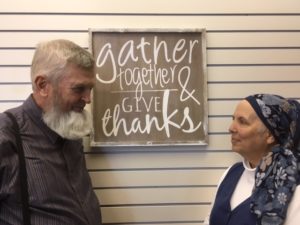Off the Clock?
By Jim Huskins
McDowell County
I recently spent twelve long minutes at the counter of a fast-food restaurant. During that time, an employee came within three feet of me on his way to the restroom. He faced straight ahead. He stared at the floor. He never spoke. He never looked my way. I was astounded. A few minutes later, he came back. Not a word. Not a glance. It was bizarre.
When I could stand it no longer, I walked behind the counter. This forced the person working the drive-thru to notice me. He eventually came to take my order. I asked about the employee who ignored me. Twice. I was told, “He doesn’t work the register. He couldn’t take your order.”
“No problem,” I responded. “But surely he could have acknowledged my presence and told me that he would get someone to serve me.”
“No, he couldn’t do that either,” I was told. “He’s off the clock.”
By this point in my “dining experience,” my frustration and disbelief turned to shock and elevated blood pressure. I wanted to ask the young man about training programs and customer service policies. My long-dead father screamed inside my head that employees owe loyalty to those who write their checks. Pure self interest should encourage every employee to make a habit of assisting customers. If nothing else, ignoring a fellow human in need of assistance is a gross violation of something once called “common courtesy.”
All these things flooded my mind as I stared in disbelief across that cash register, but I realized that further conversation would be wasted effort. The young man who told me that his coworker was off the clock had no interest in my opinions. I placed my order without additional comment. Over the next few days, however, I found myself obsessing over the disastrous results of something called compartmentalization.
Psychology Today defines this term as: “A defense mechanism in which people mentally separate conflicting thoughts, emotions, or experiences to avoid the discomfort of contradiction.” When our actions are inconsistent with our convictions, we experience something called “cognitive dissonance.” To avoid resulting pain, we often resort to denial, repression, projection, and other mind games.
Most believers experience times when the inconsistencies between our convictions and our actions are almost unbearable. One of the most popular mechanisms for coping is pretending that we are “off God’s clock.” Perhaps these interludes when we convince ourselves that God is not watching should be labeled “time off for bad behavior.”
This approach stands in contrast to one the most beloved verses in Scripture. Psalm 19:14 reads, “Let the words of my mouth and the meditation of my heart be acceptable in your sight, O LORD, my rock and my redeemer.” My treatment of this verse is indebted to the work of Hebrew scholar, Thom Thorne.
Through technical analysis of the Hebrew text, Thom makes the case that King David’s supplication for acceptability is more than a platitude or flippant prayer to offer when we want to convince God that we are “being spiritual.” Hebrew syntax is different than English word arrangement, but in this case the difference adds even more emphasis to a powerful set of ideas. Thom’s literal translation of Psalm 19:14 reads: “Let these be for pleasure, goodwill, acceptance, liking, and favor: the words of my mouth and the thinking, meditation, planning, talk, music, and even the playing—of my mind, my character, my disposition, my inclination, my loyalty, my concern, my intention, and my purpose.”
The next two Hebrew words proclaim David’s desire that all these aspects of his person and character would qualify to stand the scrutiny of Holy God’s most intimate focus. David is not content to merely put on his best suit and shine his Sunday shoes for a once-a-week trip to “meet with God.” Instead of pretending that he could hide certain parts of himself from all-knowing God, David pursued the opposite of compartmentalization. His core desire was that God would grant him the grace of purifying his every thought and action. Rather than hold back a few “secret rooms” in his psyche, David wanted to shine the light of holiness into every nook and cranny of his existence.
The next-to-last word in this verse can be translated “large rock” or “boulder.” Hebrew thinking recognizes this as an image of God because it represents both an unshakable foundation and an unassailable defensive position. When we make our stand in God’s mighty shadow, we need never fear the devil’s slings and arrows. David wanted every aspect of himself to be protected.
The last word in David’s prayer is “redeemer.” A redeemer reclaims ownership by paying a debt. Every human owes a debt to Holy God because He cannot abide the presence of sin. Thanks be to God that He sent his own Son to pay the debt that we could never pay. Long before Christ was born, King David knew that God is in the redemption business.
David’s prayer is that every aspect of his life—even his pleasures, his recreations, his secret plans and ambitions—might stand the test of God’s closest scrutiny. It is part of one of the most magnificent chapters in Scripture. Psalm 19 is a thrilling hymn of praise. Most Christians are convinced that God’s law is flawed and burdensome. David says that Torah is perfect and that it revives the soul. We are taught that the instructions for living God gave through Moses represent some counterfeit of faith. David said, “The rules of the LORD are true and righteous altogether.”
The Nineteenth Psalm sprang from David’s recognition that a life worth living is devoted to righteousness. He wanted nothing more than to abide in God without the baggage of his sinful nature. At a time when many “Christian leaders” insist that sin no longer matters, King David shouts across the centuries that those who earnestly desire to live every moment in the presence of Holy God are never off the clock.
__________________________________________________
Jim & Beverly Huskins are members of Obedient Heart Fellowship in McDowell County. Beginning July 2, 2022 Obedient Heart Fellowship will meet at 10:00 Each Sabbath (Seventh Day) in space graciously shared by New Covenant Church in Christ. 2460 US 221 Business N. In Marion, NC. Call for info. 828-460-7913. You can read more good Christian news from Jim HERE.
__________________________________________________






